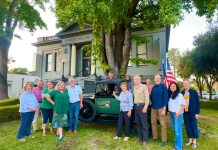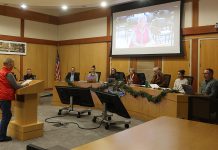The Alliance Teen Health Center is now in its second week of
service, and will be hosting an open house on Wednesday, November 3
at 5:30 p.m. The event is designed to educate the community—and
particularly parents—about the services provided by the center.
“Prevention is the big word for us. If we can prevent disease
and we can prevent teen pregnancy, we can just let them focus on
being a teen and enjoying these precious years,” said Jan
Marsiglia, site supervisor for the center.
The brand new center began serving teen clients on October 18.
It provides local youth, ages 12 to 21, with free access to
reproductive health information and physician services. The
overarching goal is to promote conscientious decision-making, thus
preventing teen pregnancy and sexually transmitted infections.
“We don’t want them to take on the responsibility of raising
children before they’re ready. We want to provide them with a place
that’s their own, where they can feel comfortable asking
questions,” Marsiglia said.
The clinic is staffed by the same trained, certified health
educators who teach puberty and family life skills education—often
called “sex ed” by students—at local schools. Health educator
Bertha Diaz teaches eight hour curricula at schools in Windsor,
Healdsburg, and Cloverdale. When teens visit the center, they are
likely to see her friendly and familiar face.
“A lot of kids get misinformation from their friends, the media,
and what they see on TV or in the movies,” said Diaz, one of two
on-staff health educators.
She listed several common teen misconceptions: that two condoms
are safer than one (the friction generated actually makes them less
safe, and more likely to break), that the manner in which you have
sex can prevent pregnancy (as long as no protection is used, there
is a chance of getting pregnant), or that taking a friend’s birth
control pill will prevent pregnancy (it won’t).
While conversations like these may cause some adults to blush,
the point of the Alliance Teen Health Center is to provide a place
where teens feel comfortable asking these questions to health
educators who are trained and prepared to answer them. The space
is, with the exception of staff, adult-free and designed to make a
teen feel at home.
“It’s really more like a living room, so it’s not so clinical,”
Marsiglia said.
A pair of black leather chairs and a green suede couch with
funky pillows greet newcomers in the waiting room. Stenciling on
the wall encourages visitors to “pause, relax, breathe.” Physician
consultations that don’t require a physical exam take place in a
decidedly atypical doctor’s office: a friendly-but-professional
room with a white couch, green throw, red chairs, and rainbow rug.
(Yes, the requisite anatomical diagrams still adorn the wall.)
“This is one on one in a confidential setting, so they can ask
questions they’d be afraid to ask in class,” Diaz said.
There is only one exception to the policy of
confidentiality.
“We’re held by law that if anybody appears to have been abused,
we have to report it. But everything else is completely
confidential,” Marsiglia said.
On their first visit, all teens meet with a health educator for
counseling prior to receiving any health services. Counseling
includes conversations about physical as well as emotional health,
and discussions about relationships.
“We go from abstinence. We want students to wait until they’re
ready and it’s the right time, and not to fall to peer pressure,”
Marsiglia said. But if a student is already sexually active, or
does not plan on remaining abstinent, the focus shifts to ensuring
that the student remains safe, healthy, and not accidentally
pregnant.
Marsiglia noted that it was important to remember what the teen
center does, and doesn’t, do. Specifically, the center does not
provide any services that require parental consent. The center does
not directly dispense birth control, since it is not a pharmacy,
but the physician can write prescriptions for it. Physical exams,
pregnancy tests, and medical consultations are also available.
“I think the myth of what people say about teen centers is that
they might perform abortions. We don’t,” Marsiglia said.
She added, “We’re not just here dispensing birth control, we’re
here dispensing information. We want teens to make conscientious
decisions. When they have accurate information, they can make
better decisions.”
Marsiglia noted that, as a general rule, 95 percent of the teens
who visit health centers are female. She and the health educators
hope to outreach to more young men.
“When we do male education, I always try to point out that it’s
not just the girl’s responsibility, it’s both of your
responsibilities,” Diaz said.
And Alliance Teen Health Center leaves no financial excuse for
the guys, either.
“Everybody who comes in here is seen for no charge,” Marsiglia
said.
The Alliance Teen Health Center is located at the Park &
Recreation Center at Foss Creek School in Healdsburg. Clinical
hours are 1:30 to 5:30 p.m. Mondays and Thursdays. The center is
open and staffed by bilingual health educators after school on
other days of the week. The physician is also bilingual. A private,
back entrance is currently under construction and should be
completed within a week so teens can access the center
privately.








